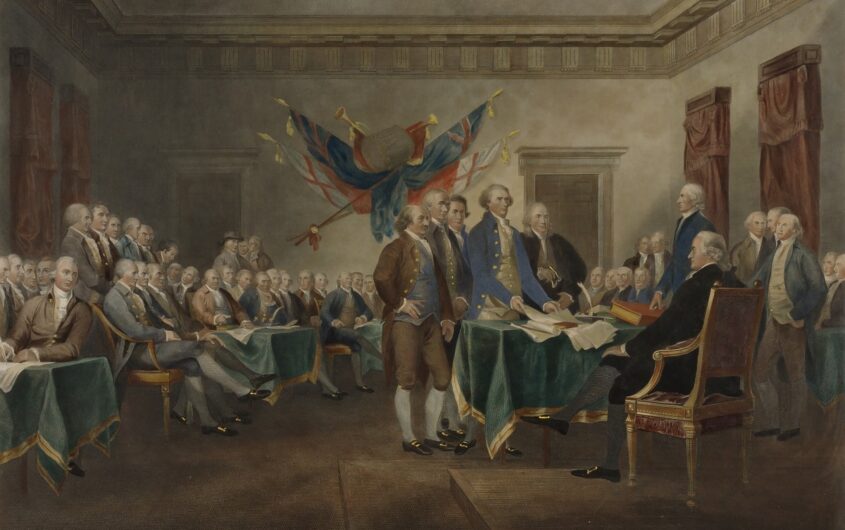
Smithsonian American Art Museum, Gift of International Business Machines Corporation
The American Revolution and Transatlantic Relations

Jeff Rathke
President of AGI
Jeffrey Rathke is the President of the American-German Institute in Washington, DC.
Prior to joining AGI, Jeff was a senior fellow and deputy director of the Europe Program at CSIS, where his work focused on transatlantic relations and U.S. security and defense policy. Jeff joined CSIS in 2015 from the State Department, after a 24-year career as a Foreign Service Officer, dedicated primarily to U.S. relations with Europe. He was director of the State Department Press Office from 2014 to 2015, briefing the State Department press corps and managing the Department's engagement with U.S. print and electronic media. Jeff led the political section of the U.S. Embassy in Kuala Lumpur from 2011 to 2014. Prior to that, he was deputy chief of staff to the NATO Secretary General in Brussels. He also served in Berlin as minister-counselor for political affairs (2006–2009), his second tour of duty in Germany. His Washington assignments have included deputy director of the Office of European Security and Political Affairs and duty officer in the White House Situation Room and State Department Operations Center.
Mr. Rathke was a Weinberg Fellow at Princeton University (2003–2004), winning the Master’s in Public Policy Prize. He also served at U.S. Embassies in Dublin, Moscow, and Riga, which he helped open after the collapse of the Soviet Union. Mr. Rathke has been awarded national honors by Estonia, Latvia, and Lithuania, as well as several State Department awards. He holds an MPP degree from Princeton University and BA and BS degrees from Cornell University. He speaks German, Russian, and Latvian.
__

Joseph de Weck
Institut Montaigne
Joseph de Weck is a Senior Fellow at Institut Montaigne and the Europe director at Greenmantle, a macroeconomic and geopolitical risk consultancy. A columnist for the German foreign affairs magazine Internationale Politik Quarterly, he is a regular contributor to publications such as Der Spiegel and The Atlantic. In 2021, he published "Emmanuel Macron: Der revolutionäre Präsident," a German-language essay on Macron’s first term and portrait for French society. Joseph is also a fellow with the Philedelphia-based Foreign Policy Research Institute. He holds a BSc from the London School of Economics and a MA from Sciences Po Paris and the University of St Gallen.
History reminds that there is risk in forcing your vassals to become militarily self-sufficient.
A people enjoying the protection of an offshore great power bristles at being asked to pay more for their own defense in the face of persistent security threats. The hegemon is incredulous: it has expended enormous blood and treasure in global conflicts to preserve international order, ensuring security in faraway lands, a cost that its budget can no longer bear. Unwilling to tolerate this security free-riding any longer, it takes steps to help offset its defense expenditure and shift the burden from the protector to the protected through tax increases, a thoroughly reasonable position according to the great power’s political consensus. This leads to a political earthquake with repercussions for global politics and the balance of power for generations to come. It may have a contemporary ring, but the people in question are the population of the British colonies in eighteenth-century North America. The hegemon? The United Kingdom. The result? A political backlash that sparked American independence, changed the trajectory of global economic development, and set off more than a century of uneasy relations between the United States and the mother country.
U.S. President Donald J. Trump complains about Europe ripping off Washington. Americans shoulder the financial and military burden of defending Europe from Russia, the U.S. president argues. In return, Europeans don’t even buy Made in America goods, running huge trade surpluses with the United States. Thus, Trump wants Europeans to step up defense spending and buy U.S. goods if they want to continue to benefit from the U.S. security guarantee. In the meantime (and perhaps for the long term), he will extract compensation from them by taxing their exports to the United States.
Team Trump’s aggressive stance toward “freeloading” Europe seems comprehensible. Yet the analogy with North American colonial history suggests shifting the burden of the U.S. empire from the core to the European periphery could undermine the basis of U.S. prosperity and political hegemony.
The British Empire trying to tax its North American colonies was the beginning of the U.S. independence movement. The colonies were security free-riders, living under but not paying for the UK’s security umbrella. After running up debt to protect its North American colonies against the French and various Native American tribes during the French and Indian War (1754-1763), London felt compelled to introduce taxes on its dominion. The Sugar Act (1764) and Stamp Act (1765) introduced a very mild taxation expressly to finance the cost of maintaining the British Army in the colonies. This was part of the cost of victory for the British, who prevailed over the French in North America and more broadly in the Seven Years’ War (1756-1763), expanding their empire. Since the American colonists had a far lower tax burden than the British population, it seemed eminently reasonable to ask the colonies to contribute to their own security.
The colonists fiercely opposed the measures (“no taxation without representation”) and retaliated by boycotting products, notably tea, from the motherland. To break this boycott and help the struggling East India Company establish a monopoly in North America, London passed the Tea Act in 1773. That was a crucial point of escalation leading the colonists to famously dump the supplies of tea in the harbor of Boston.
Britain sought to enjoy the benefits of its growing empire—especially the Navy’s dominance of the seas and the coercive power that gave London in global affairs—while outsourcing some of the costs to the American colonies and keeping them geopolitically, economically, and technologically subservient. Britain’s have-your-cake-and-eat-it policy turned out to be the spark that galvanized American aspirations for independence: the colonists saw their sovereignty diminished, and as it turned out, they grew to value sovereignty more than Britain’s security bargain. Their actions in opposition to British policies nurtured a sense of common cause among disparate populations of the thirteen colonies, building a sense of nationhood that previously had not existed.
An Empire on the Cheap
In a stark reversal of roles, it is now Mother America that wants not only for Europeans to spend more on defense but also tax it with exorbitant tariffs. Now it is the United States, fiscally constrained and believing itself to be militarily overstretched, that is trying to shift the costs of its empire to the periphery.
The foreign policy risks for the United States are considerable. The post-World War II model of U.S. protection for Europe masked a transactionalism at its heart: Europe paid not in dollars but in the currency of sovereignty by following the U.S. lead on the big strategic questions. Eventually, after recovering from the war, Europe also financed U.S. debt and more recently has become entirely dependent on U.S. technology and digital services (which are not captured in the trade deficit in goods). What Trump fails to see is that Washington’s “empire by invitation” since 1945 was a huge win for Americans.
After 1945, the United States got an empire on the cheap. It didn’t have to coerce Europeans to stand with Washington—Europeans, divided and exhausted by history, craved U.S. leadership.
Geopolitically, the United States gained enormous leverage in world affairs by having more than two dozen European nations join it in most of its own strategic endeavors, whether it is confronting China on trade or putting sanctions on Iran. The EU is still 17 percent of global GDP and home to crucial technology from lithography machine-maker ASML to the SWIFT payments system, which is key in sanction regimes. And Europe, by far the most visited region in the world, is a giant when it comes to soft power. As much as Washington wants to diminish the fiscal burdens of empire, there is little American appetite for ceding its influence on the trajectory of major European policy debates, such as the response to the Russian war in Ukraine, the future of European technology and regulatory policies, or the nature of European economic relations with China.
The End of Cakeism?
If Europe is worth having on your side in the geopolitical arena, European dependence on the United States also paid off handsomely in dollar terms for Americans.
Savings from old Europe flowing to the United States is a major underpinning of the dollar’s standing as a global reserve currency. Europeans hold more U.S. treasuries than Japan and China combined. And it is the “exorbitant privilege” of controlling the world’s currency, as former French President Valéry Giscard d’Estaing put it, that allows Washington to run huge fiscal deficits and boost its economy. The United States and Europe are also each other’s main sources of foreign investment, an economic interdependency without modern parallel.
Finally, it is also Europeans’ trust in Uncle Sam as the ultimate security guarantor that explains why Europeans were not worried about becoming fully dependent on U.S. services and technology. Europe is by far the biggest digital ad market outside the United States—six times bigger than Latin America.
Europe is a major source for U.S. tech giants to gain scale and make juicy profits. It is no coincidence that the United States runs a large trade surplus in financial and tech services, explaining why the overall transatlantic trade accounts are close to balanced when goods and services are both aggregated.
What Trump fails to see is that Washington’s “empire by invitation” since 1945 was a huge win for Americans.
Trump’s “reciprocal tariffs” on Europe (to say nothing of the threat to Danish sovereignty over Greenland) could turn out to be an analogy to Britain’s Sugar Act in the history of the United States—the starting point of a movement that led to U.S. independence two decades later.
On the evening of his election victory, incoming German Chancellor Friedrich Merz said he would try to “achieve independence from the U.S.A. step by step. I never thought I would have to say something like this on a television program.” These are not just words. Merz, a fiscal conservative, secured an exemption for defense spending from the country’s constitutional “debt brake” and has pledged to do “whatever it takes” for security. Despite the stumble out of the gate when Merz required a second vote to secure the chancellorship on May 6, his government’s commitment to forging European approaches appears undiminished.
Paris for its part has initiated discussions with Berlin and Warsaw to discuss an extension of its nuclear deterrent to the rest of Europe. Brussels is readying a legislative package to promote the European defense industry. The incoming German government has agreed to maximize German and European autonomy through defense investments including a growing emphasis on buying European. The new coalition government also agreed to prefer European cloud data providers to American ones in public tenders.
All of this doesn’t mean that Europeans will become independent from the United States in military terms in the near future. Even the most optimistic in Paris say such a process would take at least a decade. But clearly Trump has managed to get Europeans to agree and think of previously unthinkable things, such as EU debt for European defense spending and a common nuclear deterrent. At the same time, Trump has managed to push public support in Europe for the EU up to 74 percent, a record for the poll that has been undertaken since 1983.
Americans should be clear-sighted about the punitive trade policy, which undermines the United States’ image as a predictable and like-minded economic partner. Pushing Europeans to bear a larger burden and become more self-reliant has a compelling fiscal logic and may be healthy for Europeans, but it will go hand in hand with diminished U.S. leverage in Europe, which is a crucial purchaser of its services and underwriter of America’s “exorbitant privilege.” Is that really a good deal?








